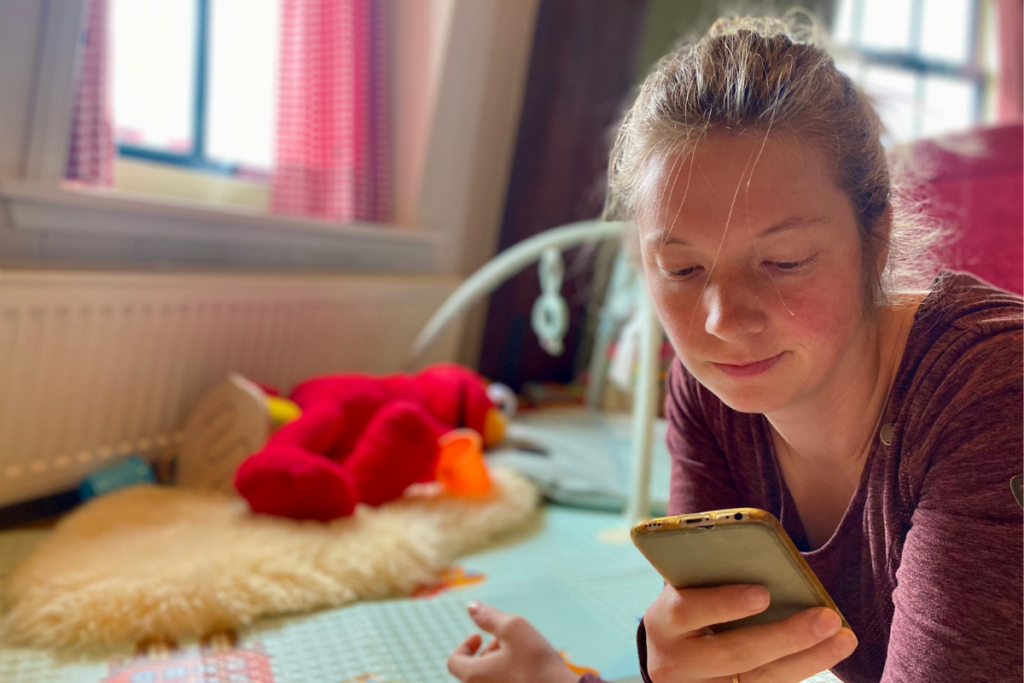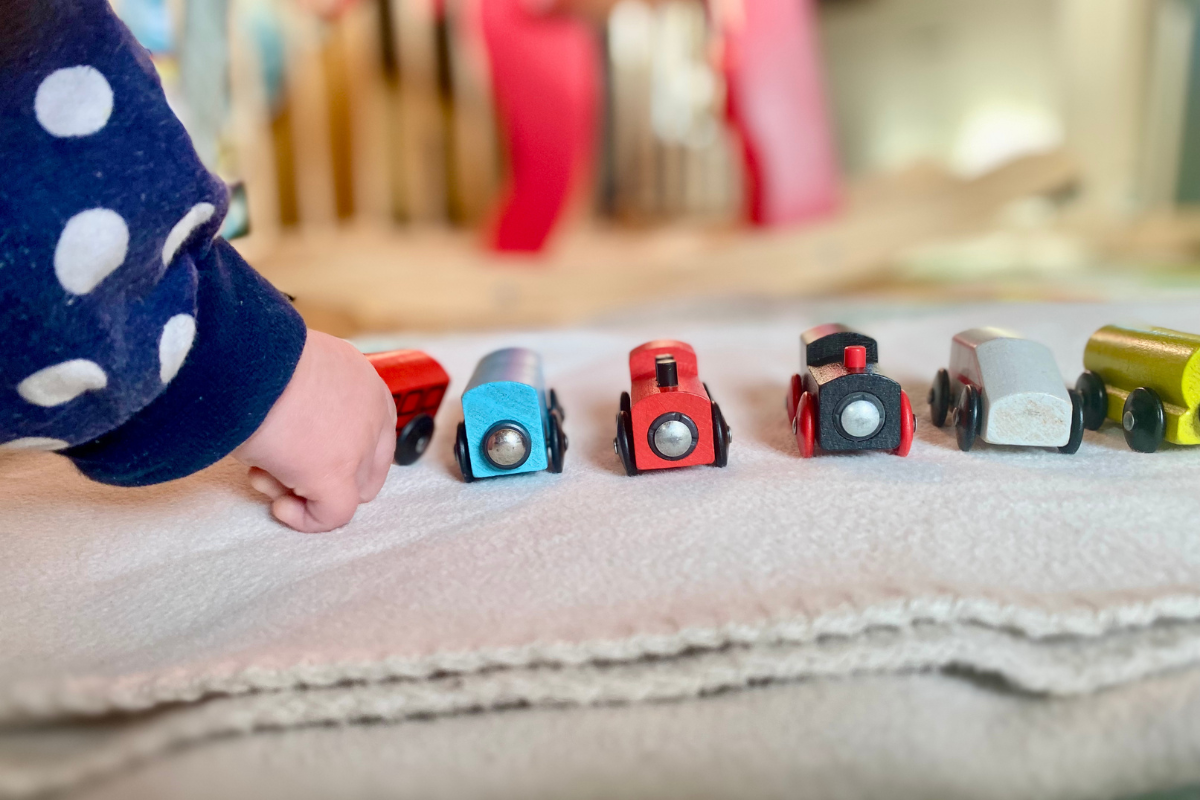How to spend less time on your phone as mom
Do you know the feeling when you want some time for yourself, you take your phone and the next half hour is gone? In this blog I share encouragement and simple, practical tips on how to spend less time on your phone as a mom. Let’s start taking more actual me time, connecting with our children and minimize screen time.

Why spending less time on your phone?
There are many reasons why I chose to spend less time on my phone. It takes time I simply don’t have, it makes me disconnect with my children and it prevents me from being present in the here and now. When I ask my friends and family how they are I normally get this respond: busy. We are all busy having too much up and little time left for ourselves and maybe even others.
According to this research people spend an average of 4 hours and 37 minutes on their phone DAILY! People go and check their phone for less than 2 minutes more than 40 times a day. I mean that’s wild! Imagine how much less busy we were when we would check our phones only once or twice a day?
Other than the time it consumes there are alarming risks for too much screen time. This study showed an increased risk of dementia or parkinson with excessive screen use. Another study showed that it harmed sleeping. This study even suggests that a lot of screen time makes your brain volume decrease. They called it ‘digital dementia’.
With spending less time on my phone I want to have a slower life with more intentional time as a mom, wife, friend and homemaker.
Being the good example on less time on your phone
Another very important reason to spend less time on your phone is the example you give to your children. Later in this blog I will share some statistics on screen time among kids and those numbers are alarming too!
If my little baby sees me on my phone all day over and over again guess what she want’s to look at too? Even if we tried to not look at our phones as often as possible we took so many pictures and videos all through our days that our girl understood real quick that this device is really interesting.
Think about it this way: if your child learns from you that your phone is interesting because it sees you with it what else could you learn your child? Imagine it would see you reading a book or studying in your bible instead. Wouldn’t this be a better example?
Do I have a phone addiction?
Phone addictions are a real thing. Especially among students it is well researched as well. In this study 6 out of 10 people had a phone addiction. Considering the signs of a smart phone addiction that really is a big problem. Ask yourself the questions:
- Do you frequently check your phone with no purpose?
- Do you pick up your phone immediately if there is a small break like waiting in a line or a pause in a conversation?
- Are you afraid of missing important texts or calls and feel the strong urge to check again and again?
- Do you feel lost without your phone?
- Does the thought of switching off your phone for one day makes you uncomfortable?
- If you feel stressed, afraid, bored or frustrated is your phone your only way of dealing with those feelings?
- Do you feel bad, stress or anxious after you used your phone?
- Do you have troubles thinking clearly because your phone distracts you?
- Do you struggle to get things done because of your phone?
- Do you use your phone during face-to-face conversations?
Often times we are on our phones too much when we feel overwhelmed. Ask yourself what you can do instead if you feel stressed overwhelmed or anxious. In this blog I share my tips for when you feel overwhelmed as a new homemaker. Download my to-do list template if you feel like you have to reorganize things and get some grip back on your life.
Why phones are addictive
According to an interesting study we are not addicted to our phones but rather to the social connection and immediate entertainment they deliver.
When we engage with others we produce our happy hormone dopamine in our brains. As soon as we pick up our phone the hormons start coming in, kind of like a sugar rush. That creates a huge urge to pick up our phones again and again.
Through our phones we are one click away from ‘engaging’ with our friends and consuming endless content that will take our minds of everything that bothers us. If we want to be entertained in real life we have to get up and start an activity. But on our phones the activity already started. Think about it that way: on our phones there is a party going – at all times. No matter when you open your device you can join right into the party that is already going. And it never stops! Social medias work with never ending loops of entertainment. You never reach the bottom of a facebook page or the last video from tiktok. There is always more. That way it makes it hard to put your phone away.
How can you spend less time on the phone
There are a few practical things that might help you to spend less time on your phone.
- Make your phone less smart
- Delete unnecessary apps
- Change the background to black and white
- Delete social media accounts
- Sign off and disable cookies
- Disable notifications
- Create no phone spaces and times
The first step towards spending less time on your phone is making it less attractive to look at. Change both homescreen and lock-screen to black. Delete nice widgets that show you pictures of your family or the weather. If you want to go all in change your color scheme to black and white. There is nothing less engaging than watching your social media accounts in black and white.
Make your phone less smart in order to spend less time on it. Delete as much functions as possible. Think about social media, but also shopping apps and entertainment. Delete your social media accounts. If you need to look things up on youtube for example do it in the browser. Disable cookies and sign off your youtube account. This way there will be no personalized video recommendations, making it easier to stop or not even start scrolling in the first place.If you want to keep certain apps as a messenger app or email, make sure to switch off notifications. That way you have to actively open the app to see if someone texted you.
Now that your phone is less attractive to spend time on let’s talk about phone free spaces and times.
How to set healthy boundaries for yourself and keep then up
For me a completely opt-out was not really what I was looking for. I love some of the influencers I follow on youtube and reading blogs to get inspired and encouraged. In order to better control my phone usage I implement the following boundaries:
- No short term content only long term video’s
- No phone for meals
- No phone in bed
- No phone during family time
- No phone in the car
When I want some time to myself I love to watch a video of one or two content creators that really inspire me. This is an active choice rather than scrolling endlessly through meaningless video’s. If you want to look at something that is potentially more engaging (read addictive) than what you can handle, set a timer or use a alarm app that tells you every so many minutes how long you are already on your phone.
When we are together as a family for morning and evening worship or meals we leave our phones out of sight. The same goes for the car. Either I am driving myself and cannot look at my phone or my husband is driving which gives us time to talk and connect.
Switching off my phone BEFORE I step into my bed is also crucial for me personally to not scroll another 20 minutes when I actually should be sleeping.
Less time on the phone as a family
Screen time for children is a very controversial topic. With only having one 10 month old baby you would actually have a point when you would say that I don’t really have any experience yet with this topic. There are statistics however that I want to share that are concerning at best.
The WHO guidelines for screen time for children 0-5 are ‘no screen time for children 0-2 and no more than 1 hour of screen time for children 3-5’. Only 1 out of four children ages 2 and under met those guidelines (study). In this study children with six months, watched screens for 1hr, 16 min per day, increasing to an average of 2 h, 28 min by 2 years.
According to this research too much screen time negatively affects the connection between caregivers and children, language development, social and emotional growth, obesity, sleep as well as mental health. Children using too much screens were more likely to experience anxiety, depression and aggression. They had more trouble interpreting other’s emotions as well making them less empathetic.
I think I could go on and on listing research and statistics but we get the picture. Less time on phones and screens is not only beneficial for moms, but also for kids. Not using the phone as much as you are used to might just help you a little bit to get the time and head space to navigate less screen time for your kids as well.
Ressources
In my journey to less screen time I came across the Opt-out family. Check out their blog in order to gain more tips on how to limit screen time for you and your kids.
This documentary is so impressive and made me realize of the dangers hiding behind our screens for us but especially for our kids. Take the time you gained by being less on your phone to watch with your (older) children or with your partner Childhood 2.0 – Social media dangers.
What did you help to spend less time on your phone? Share it in the comments bellow I would love to read all about it!






